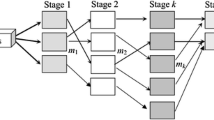Abstract
This work is motivated by a practical need for operation scheduling for an automobile manufacturing industry involved with machining of different types of vibration dampers. This work aims to minimize the makespan time for relatively different types of vibration dampers with nonuniform flow pattern through a two-parallel inseparable hybrid flow shop. A mathematical model has been developed for simulation of the hybrid flow line performance. The simulation provides data relating to completion time, queue status, and machine utilization of various schedules. After analysis and evaluation of different possible schedules, simultaneous processing of two types of dampers is suggested. The model was evaluated for nonuniform flow pattern for any number of types of dampers for different sets, and a parallel solution based on completion time is suggested.
Similar content being viewed by others
References
Allaoui H, Artiba A (2004) Integrating simulation and optimization to schedule a hybridflow shop with maintenance constraints. Comput Ind Eng 47:431–450. doi:10.1016/j.cie.2004.09.002
Gupta JND (1988) Two-stage, hybrid flowshop scheduling problem. J Oper Res Soc 39:359–364. doi:10.1057/jors.1988.63
Linn R, Zhang W (1999) Hybrid flow shop schedule: a survey. Comput Ind Eng 37(1–2):57–61. doi:10.1016/S0360-8352(99)00023-6 Proceedings of the 24th International Conference on Computers and Industrial Engineering
Guinea A, Solomon MM, Media PK, Dussauchoy A (1996) A computational study of heuristics for two-stage flexible flow shops. Int J Prod Res 34:1399–1416. doi:10.1080/00207549608904972
Gupta JND, Hariri AMA, Potts CN (1997) Scheduling a two-stage hybrid flow shop with parallel machines at the first stage. Ann Oper Res 69:171–191. doi:10.1023/A:1018976827443
Oguz C, Fikret Ercan M, Edwin Cheng TC, Fung YF (2003) Heuristic algorithms for multiprocessor task scheduling in a two-stage hybrid flow-shop. Eur J Oper Res 149(2):390–403. doi:10.1016/S0377-2217(02)00766-X
Rajendran C, Chaudhunri D (1992) A multi-stage parallel-processor flowshop problem with minimum flowtime. Eur J Oper Res 57(1):111–122. doi:10.1016/0377-2217(92)90310-6
Vignier A, Commdeur P, Proust C (1997) New lower bound for the hybrid flowshop scheduling problem, in IEEE 6th International Conference on Emerging Technologies and Factory Automation Proceeding, 1997, pp 446–451
Portmann MC, Vignier A, Dardilhac D, Dezalay D (1998) Branch and bound crossed with GA to solve hybrid flowshops. Eur J Oper Res 107(2):389–400. doi:10.1016/S0377-2217(97)00333-0
Riane F, Artiba A (1999) Scheduling multistage flow-shop problem: a brief review. In: Proceedings of the International Conference on Industrial Engineering and Production Management, pp 323–335
Oğuz C, Zinder Y, Do HV, Janiak A, Lichtenstein M (2004) Hybrid flow-shop scheduling problems with multiprocessor task systems. Eur J Oper Res 152(1):115–131. doi:10.1016/S0377-2217(02)00644-6
Sivrikaya-Şerifoğlu F, Ulusoy G (2004) Multiprocessor task scheduling in multistage hybrid flow-shops: a genetic algorithm approach. J Oper Res Soc 55:504–512. doi:10.1057/palgrave.jors.2601716
Karzata H (2000) A comparative analysis of scheduling policies in a distributed system using simulation. Int J Simul Syst Sci 1:12–20 Nottingham: UK Simulation Society
Saravanan R, Raju R (2008) Non uniform flow natured parallel hybrid flow shop scheduling problem with stochastic processes—a case study. International Conference on Fascinating Advancement in Mechanical Engineering (FAME 2008; 11–13th), pp 211–216
Cheng TCE, Ng CT, Yuan JJ (2008) Single-machine scheduling of multi-operation jobs without missing operations to minimize the total completion time. Eur J Oper Res 191(2):320–331. doi:10.1016/j.ejor.2007.08.019
Conway RW, Maxwell WL, Miller LW (1967) Theory of Scheduling. Reading, MA:Addison–Wesley, pp 26–28
Blocher JD, Chand S (1991) Scheduling of parallel processors: a posterior bound on LPT sequencing and a two-step algorithm. Nav Res Logist 38(2):273–287. doi:10.1002/1520-6750(199104)38:2<273::AID-NAV3220380211>3.0.CO;2-A
Chen B, Arjen P, Vestjens A (1997) Scheduling on identical machines: how good is LPT in an on-line setting. Oper Res Lett 21(4):165–169. doi:10.1016/S0167-6377(97)00040-0
Author information
Authors and Affiliations
Corresponding author
Rights and permissions
About this article
Cite this article
Rathinasamy, S., R, R. Sequencing and scheduling of nonuniform flow pattern in parallel hybrid flow shop. Int J Adv Manuf Technol 49, 213–225 (2010). https://doi.org/10.1007/s00170-009-2374-3
Received:
Accepted:
Published:
Issue Date:
DOI: https://doi.org/10.1007/s00170-009-2374-3




